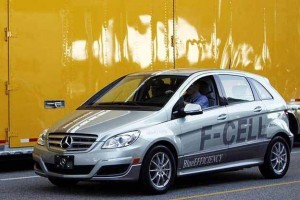Daimler AG’s top executives believe hydrogen fuel cells hold the key to developing a broader range of electric vehicles in the future.
Dieter Zetsche, Daimler AG’s top executive and head of the Mercedes-Benz Car Group, told shareholders at the company’s annual meeting in Berlin the German automaker is committed to electric vehicle technology. China, the world’s single largest car market, now has plans for putting millions of EVs on the road by the end of the decade.
“With our Chinese partner BYD, we have developed an electric vehicle in China for China,” he said. The Denza, which was developed with BYD, will debut at the Beijing Auto Show later this month, he added. “China plans to have five million electric vehicles on the road by 2020 and we’re ready to help,” Zetsche added.
The number may seem daunting but still represents only a fraction of the more than 100 million cars Chinese consumers are expected to purchase before the end of the decade.
Later this year, Mercedes-Benz, which has lagged behind arch rival BMW in the development of EVs, also plans to launch an electric version of its B-Class compact luxury vehicle “Our customers don’t need to sacrifice anything they’re used to in a Mercedes by way of cargo space or appointments – and that’s not a given with an electric car,” Zetsche noted as he took something of a dig at BMW’s electric i3, which is smaller and less luxurious than on BMW vehicles.
The electric powertrain supplied by Mercedes-Benz’s American partner Tesla will give the B-Class a range of 200 kilometers or 120 miles. “The model is absolutely right for everyday use,” Zetsche said.
“When Tesla was still being mocked by other established automakers, we decided to invest,” he said. Daimler also making a larger investment in the production of lithium ion batteries by buying 100% of the German-based battery maker Li-Tec Battery Gmbh and Deutsche Accumotive, which had been partly owned by Evonik.
“However, if you are looking for a long driving range, short recharging times and zero emissions, there’s still no way around a fuel cell,” Zetsche said, adding Daimler is the process of developing a new powertrain through a joint venture with Nissan Motor Co. and Ford Motor Co.
Hyundai, Toyota, Honda and General Motors also have made commitments to push the development of fuel cells. The Korean maker will launch sales of its Tucson Fuel Cell Vehicle mid-year, with the Japanese makers to follow in 2015.
“We view the fact that other competitors have now also recognized the potential of this technology as a confirmation of our approach,” said the Daimler CEO.
Zetsche also noted that Daimler’s Canadian partner in the fuel-cell venture, Ballard, has begun construction of new plant in Vancouver to build fuel cells spawned by the joint research effort, which is now picking up momentum.
Zetsche and other industry leaders are hoping all this activity around fuel cells will encourage governments to speed up the development of the hydrogen fuel station infrastructure that will be needed to make fuel cell vehicles more viable in the years to come.

